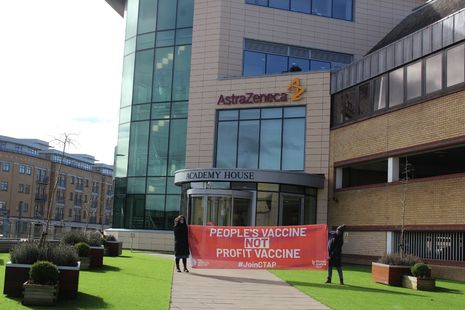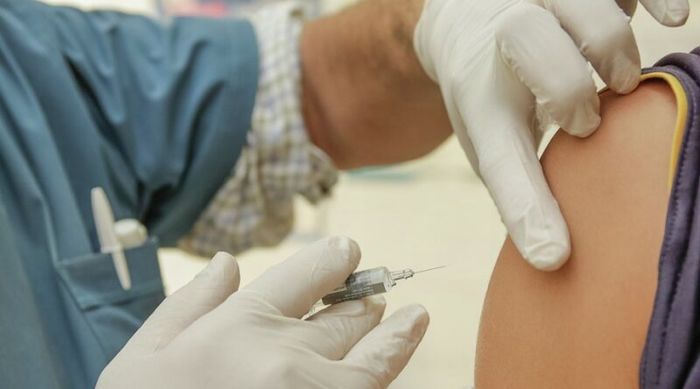Cambridge protesters at AstraZeneca site demand a ‘people’s vaccine’
Protesters are pressuring pharmaceutical companies to ‘unlock’ the vaccine for low and middle income countries

Activists from Global Justice Now (GJN) yesterday (11/03) dropped a banner outside AstraZeneca’s Cambridge Science Hub demanding a “People’s Vaccine not a profit vaccine”. The hub is one of the company’s three global research and development sites.
GJN is an organisation advocating a more “just and equal” world by pushing for equitable access to the Covid-19 vaccination.
Yesterday (11/03) marked the one year anniversary of the World Health Organisation’s (WHO) declaration of a global pandemic, and protesters are calling on pharmaceutical countries to “unlock” the vaccine for low and middle income countries.
Cambridge protesters are criticising big pharmaceutical companies for their refusal to share the “recipes” for producing Covid-19 jabs, and are pushing for the vaccine to be rolled out “across the world”.
Ana Serrano, a Cambridge activist with GJN, has said that the World Trade Organisation (WTO) meeting taking place this week is a “golden opportunity” for the UK to pressurise pharmaceutical companies to change their policies surrounding the vaccination rollout.
Serrano adds that, without action, the UK risks being “complicit in a historic failure that will cost countless lives” and criticises big companies for “restricting production to their own supply chains and delaying the end of this deadly pandemic.”
This protest comes as part of a wider “Pharma” campaign co-ordinated largely by the GJN organisation.
Nick Dearden, GJN’s director, has said that AstraZeneca’s profits suggest that the company can “easily” afford to roll out the vaccine at cost price. He adds that “lower-income countries like South Africa and Uganda are paying several times more per dose than the European Union.”
It’s been reported that there have been discussions at the WTO to suspend intellectual property and patents on all Covid-19 vaccines, in a hope that this will allow a global expansion of manufacturing. The removal of vaccine patents has been central to GJN’s campaign.
Notable figures such as Graça Machel, a former freedom fighter and first Education and Culture Minister of Mozambique, have joined the call for a “people’s vaccine” which is publicly owned and made rapidly available to all.
A recent press release has highlighted that “not a single dose [of the Covid-19 vaccine] had been administered in 130 poorer countries by mid-February” and estimates that “nearly half of countries won’t have widespread vaccination until 2023.”
A spokesperson for AstraZeneca told Varsity that they are “providing the vaccine at no profit during the pandemic period, and in perpetuity to low and middle income countries.”
AstraZeneca’s Covid-19 vaccine was granted Emergency Use Listing (EUL) by the World Health Organisation (WHO) last month to enable “global access to the vaccine during the pandemic” and for two doses to be administered at four to 12-week intervals.
The company subsequently announced at the beginning of this month that it had delivered the first of many millions of doses of its vaccine to “low and middle-income countries” such as Ghana and Cote D’Ivoire, with the aim of supplying 142 countries with the vaccine in the coming months.
Update (12/03): This article has been updated to reflect comments from AstraZeneca to Varsity.
 News / Uni Scout and Guide Club affirms trans inclusion 12 December 2025
News / Uni Scout and Guide Club affirms trans inclusion 12 December 2025 News / Cambridge Vet School gets lifeline year to stay accredited28 November 2025
News / Cambridge Vet School gets lifeline year to stay accredited28 November 2025 Science / Did your ex trip on King’s Parade? The science behind the ‘ick’12 December 2025
Science / Did your ex trip on King’s Parade? The science behind the ‘ick’12 December 2025 News / Cambridge study finds students learn better with notes than AI13 December 2025
News / Cambridge study finds students learn better with notes than AI13 December 2025 News / Pembroke to convert listed office building into accom9 December 2025
News / Pembroke to convert listed office building into accom9 December 2025








